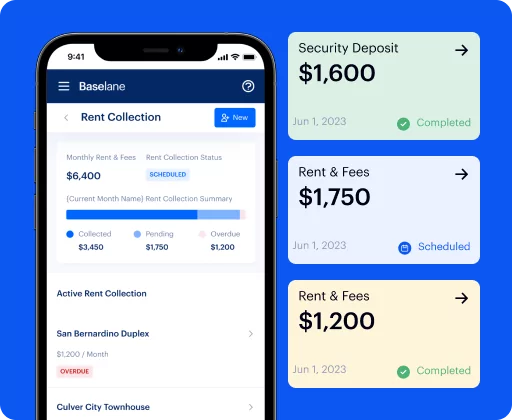Setting the right rent can be challenging. If the rent is too high, you risk taking on expensive vacancies. If it’s too low, you risk giving up potential profits. Sometimes, you’ll need to negotiate with your tenants to set a price that keeps your rental property occupied and profitable. Let’s take a look at how to negotiate fairly and effectively in this rent negotiation guide for landlords.
1. Why Should I be Prepared to Negotiate the Rent?
As a landlord, you want to get the highest rent possible for each unit. But, at the same time, nothing drains your landlord banking account faster than a vacancy. Being prepared to negotiate the rent can help you make quick decisions about responding to your tenants’ requests.
Let’s look at an example.
Imagine you’ve advertised a rental unit for $1,000 per month. You’ll get $12,000 of rent annually if you get the advertised rent price. But what happens if you’re having trouble finding a tenant willing to pay $1,000?
If you hold out and let the unit sit vacant for a month, you’ll make only $11,000. But if you negotiate and find someone willing to pay $950, you’ll end the year with $11,400.
| Monthly Rent | Months Rented | Annual Rent Revenue |
|---|---|---|
| $1000 | 11 | $11,000 |
| $950 | 12 | $11,400 |
You should also be ready to negotiate the rent when your tenant’s lease is up for renewal for the same reason; accepting a smaller increase to keep them for another year may be more cost-effective than advertising for a new tenant.
Let’s say you’re planning to raise the rent from $1,000 to $1,100. If, for example, you estimate your turnover cost to be $750 between advertising, cleaning, painting, repairs, and showings, you’re better off agreeing to raise the rent by just $50 per month than paying the cost of the turnover.
| New Monthly Rent | Months Rented | Turnover Cost | Annual Rent Revenue |
|---|---|---|---|
| $1,100 | 12 | $750 | $12,450 |
| $1,050 | 12 | $0 | $12,600 |
2. How to Prepare for a Rent Negotiation
To prepare for a rent negotiation, you need to do some math and decide on what you will be willing to agree to – and when. The numbers you will want to look at depend on whether you’re looking for a new tenant or raising the rent for an existing one.
Negotiating rent with prospective tenants
Preparing to negotiate with prospective tenants requires you to know the local rental market and where you stand within it. These are some ways you can do that.
Estimate your property’s market rent
Research similar listings and compare them to yours. This will give you an idea of how much your unit should rent for. Pay attention to the location, size, and quality of the unit, as well as what services are and aren’t included. Units that have been available for more than a month may be priced too high.
Calculate the minimum rent you can afford to accept
Use the rental property analytics tools in your rental property bookkeeping software to evaluate the cost of owning and maintaining your rental unit, factoring in variables like vacancies, equity growth, and increase (or decline) in property values. Divide by 12 to estimate the lowest rent you can accept while still breaking even.
Decide on what concessions you’re willing to make and when
With an understanding of your personal finances and the rental market, you can make some decisions about what you will and won’t agree to in a negotiation.
One calculation that can be particularly helpful is comparing the cost of a vacancy to the cost of accepting a lower rent. Over the course of a year, having a one-month vacancy is equivalent to reducing the rent by 8.3%. For this reason, you may be willing to accept less rent if doing so will help prevent a vacancy.
Work this out by comparing two scenarios:
In Scenario A, you accept a one-month vacancy to find a tenant willing to pay your ideal rent. For example, if you could realistically charge a new tenant $1,500 per month, multiply $1,500 by 11 months to get a total of $16,500 for the year.
In Scenario B, you accept a lower rent from a tenant willing to move in right away. Divide your annual revenue from Scenario A by 12 to get the minimum rent you can charge to break even. Continuing the example above, you can earn $16,500 for the year by charging $1,375 for 12 months.
With these two numbers in hand, you enter the negotiation knowing that accepting anything less than $1,375 is worth taking on a vacancy. Timing is essential, too. The more time that goes by, the less likely it is that you’ll get your desired price. Think ahead about when you’ll be willing to make concessions. For example, you might decide to stay firm for two weeks to see if you get any applications before you’re willing to negotiate.
Negotiating rent with existing tenants
You’ll also want to prepare to negotiate with existing tenants at the end of a lease or when you’re giving them a rent increase. In this case, the key to success is balancing the cost of a lower rent increase with the cost of turning over the unit.
Estimate your property’s market rent
If your tenants give notice and plan to move out, how much could you get for your rental unit from a new tenant? If your state or city has rent control laws, you’ll likely be able to get more from a new tenant than your existing one.
Estimate the cost of turnover
How much would it cost you to attract a new tenant? Consider the cost of cleaning, repairs, painting, advertising, and showings and factor in the cost of any vacancy you expect to shoulder.
Let’s say you’re planning to raise the rent from $1,450 to $1,500 per month. If you estimate it will cost $750 to turnover the unit, plus a one-month vacancy, your total cost of turnover is $2,250.
Calculate the breakeven point between getting a new tenant and keeping your existing one
In many situations, the cost of turning over the unit is much higher than the cost of negotiating a lower rent increase. Determine the breakeven point between these two scenarios by amortizing the cost of turnover over one year.
Continuing our example above, a $2,250 cost of turnover works out to an average of $187.50 per month. You will have to get at least that much more than what your tenant is currently paying to make the turnover worth it.
Since your example tenant is already paying $1,450, you’re better off to renew their lease with the same rent than let them move out unless you can attract a new tenant willing to pay at least $1,638 per month.
Turnover ÷ 12 + Current rent = Minimum new rent to cover turnover cost
$2,250 ÷ 12 = $187.50 + $1,450 = $1,637.50
3. What are Some Tips for Rental Negotiation?
To wrap things up, here are some quick tips for a successful negotiation.
- Prepare, prepare, prepare. Have a plan and know exactly where you stand before entering into any rental negotiation.
- Use tools like Rentometer and check comparable listings to get a sense of your unit’s market value before negotiating the rent.
- Be prepared to let a tenant walk away if they’re not willing to pay a fair price for the rental.
- Remember that a negotiation is just a conversation. They need a landlord just as much as you need a tenant. Make it your goal to find a way for everyone to get what they need.
- Ask a lot of questions. Find out what’s important to your tenant, and you may identify something they care about even more than money.
- Be creative. Consider offering additional services or a temporary incentive that will cost you less than lowering the rent.
- Don’t forget about your existing tenant’s cost-benefit of negotiating. It’s not worth their while to argue over $25 a month if it’s going to cost them $1,000 to move.
- Know when to say no. There are times when it’s better to stand your ground. Sometimes it’s better to let someone walk away – and it’s not always about the money.
- Win their heart, not their mind. People are far more likely to make decisions based on emotion than logic.
The bottom line
Being willing to negotiate the rent can help you keep a good tenant and save you money by reducing vacancies. But that doesn’t mean you should give in to your tenants’ every demand. Know where you stand and be prepared for negotiations so that you can give your tenants what they need and still come out ahead.
FAQs
Tenants can ask, but you don’t have to agree to negotiate. There could be consequences, however. Refusing to negotiate may prolong the time it takes to get a new tenant, or it could lead to your existing tenant moving out.
Start rent negotiations by being prepared. Know the market value, and know how much you stand to gain or lose by making concessions. During the negotiation, ask questions to understand your tenant’s point of view. When you come to an agreement, be sure to formalize it in writing.
If you don’t have any wiggle room when it comes to rent, get creative about what you can negotiate for. Consider offering additional services like utilities or parking. Instead of lowering the rent, perhaps you could give a temporary discount. Or you may be able to make improvements that are mutually beneficial, such as replacing aged appliances or flooring.







